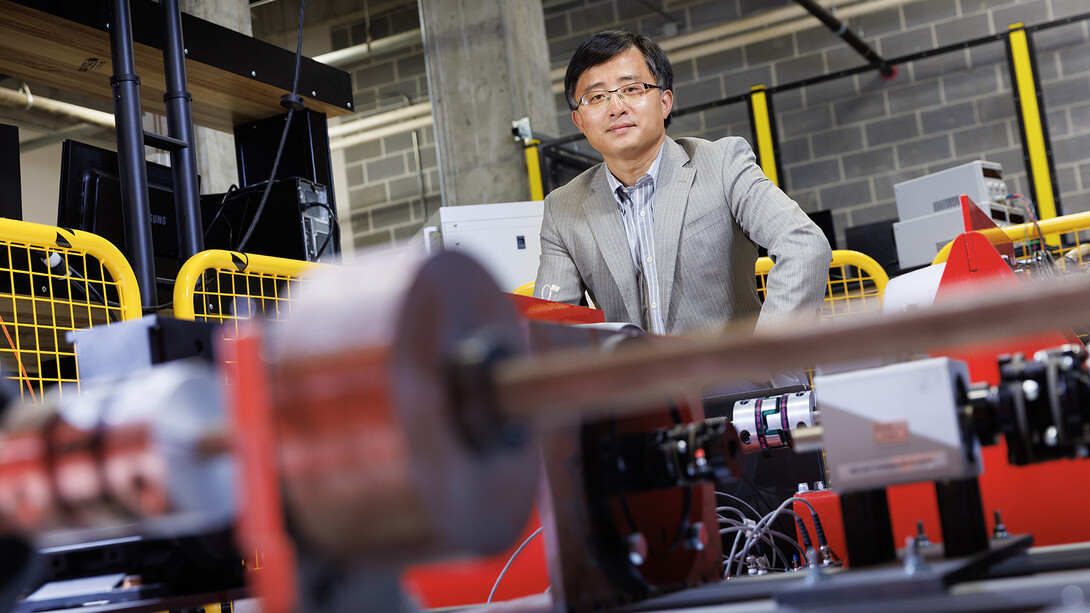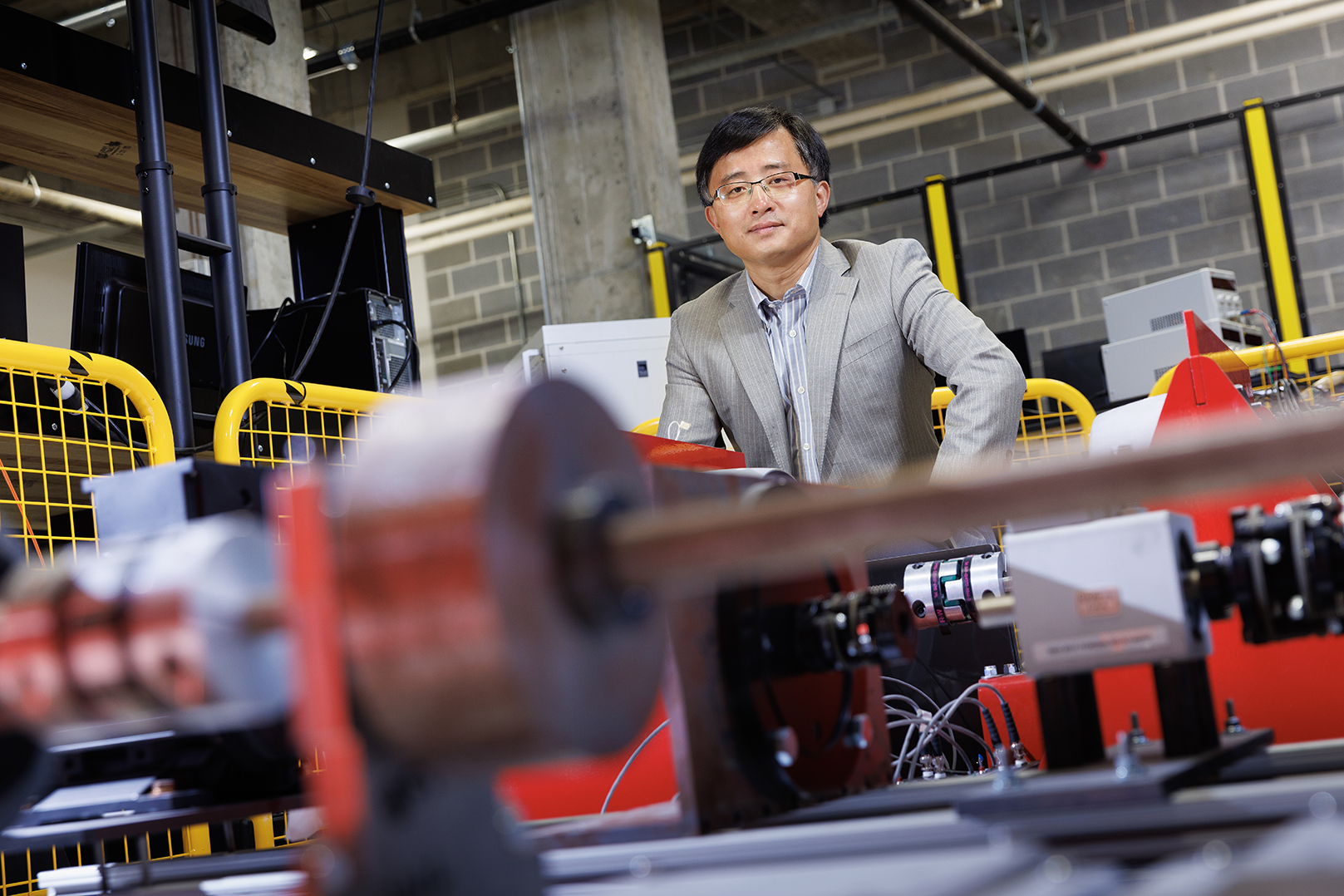
The University of Nebraska–Lincoln’s Wei Qiao has been elected a senior member of the National Academy of Inventors.
The academy’s senior member program honors early-stage innovators and inventors whose success in patents, licensing and commercialization has the potential to positively impact society. Senior members are rising leaders in their fields whose work has gained momentum toward significant achievement in innovation. Each member holds a U.S. patent that has been licensed or commercialized and/or holds five or more issued U.S. patents.
Qiao is the fourth Husker researcher to earn the honor since the program launched in 2018.
Qiao, Clyde Hyde Professor of electrical and computer engineering, is an internationally recognized engineer in the areas of sustainable energy and energy efficiency. His work focuses on developing models, software and hardware solutions, and decision-support tools that enable some of the most promising technologies of the future, including next-generation wind and solar power, electric vehicles and electric grids.
Qiao, a named inventor on 13 issued U.S. patents, said he’s proud of the extent to which industry members have adopted his technology.
“A lot of my work is closely related to industry production, manufacturing and improving people’s daily lives,” he said. “Most of my grad students end up working in industry, developing new products that improve daily life and improve the manufacturing process. I think that’s the major impact of my work.”
He is a pioneer in the principles, theoretical foundations and methodologies for building online, real-time, nonintrusive monitoring systems for wind turbines. The systems he developed can diagnose mechanical and electrical flaws, provide a prognosis and predict the remaining useful life of the turbine.
The technology relies on tracking electrical signals from the turbine’s generator and motors. When a turbine component has a mechanical flaw or other fault, it produces vibrations. Those vibrations, in turn, modify the generator or motor’s electrical pulses. Analyzing those changes allows operators to glean information about the turbine’s condition. As the approach does not require additional sensors or data-acquisition equipment, it reduces the cost and complexity of monitoring.
The technology has been adopted by companies like General Electric and serves as a blueprint for academic and industry researchers and wind turbine manufacturers looking to build similar monitoring systems.
Qiao has also led the way in advancing sensorless control technology. Control and operation of any system, whether a wind turbine or an electric vehicle, requires data. Traditionally, that data is collected via sensors. But the use of sensors adds additional cost and wiring complexity to systems. Sensors can also fail in harsh environments related to weather, high-speed operation or heavy load conditions.
“We want to make many of these systems operational at comparable performance with a reduced number of sensors, or when some sensors fail,” Qiao said.
He has designed some of the first intelligent sensorless tracking control methods for wind turbine generators, then expanded his strategies to other areas. This work gave rise to a collaboration with John Deere, whose customers were seeking more reliable, energy-efficient electric vehicles. The company uses a smaller, more efficient alternative to traditional motors to power some of its vehicles but needed a method for increased control. Deere partnered with Qiao to solve the issue, a collaboration that yielded three patents.
Qiao and his students have also worked with Ford, Toshiba, Nexteer Automotive, McNeilus, MagniX, Amazon and PARC in the areas of condition monitoring or electric motor control.
Qiao is also an innovator in developing decision-support tools that help wind, solar and hybrid energy producers compete in the electricity markets. Sustainable energy producers are required to submit a bid more than 24 hours in advance, but they face more uncertainties — such as the wind power forecast — than a traditional power plant. To address that challenge, Qiao developed mathematical models and algorithms, called stochastic optimization-based tools, aimed at generating optimal bids that maximize producers’ revenue. One of his software packages, WindTrade, was adopted by The Energy Authority and the Nebraska Public Power District. Software solutions like these are key to making renewable energy an economically attractive option.
In total, Qiao has authored 99 peer-reviewed journal articles and 176 peer-reviewed conference proceeding articles. In 2022, he was elected a fellow of the Asia-Pacific Artificial Intelligence Association; in 2021, he received the Power Electronics Society Sustainable Energy Systems Technical Achievement Award from the Institute of Electrical and Electronics Engineers; and in 2019, he was named an IEEE fellow.
Qiao is a dedicated mentor, serving as chair of the electrical engineering graduate program since 2015. He has helped launch more than 30 students into careers at companies like GE, Eaton, Texas Instruments and General Motors, where they’ve invented new technologies that improve everyday life.
The NAI will honor Qiao at its 12th annual meeting, scheduled for June in Washington, D.C. Qiao is one of 95 newly elected senior members this year.








